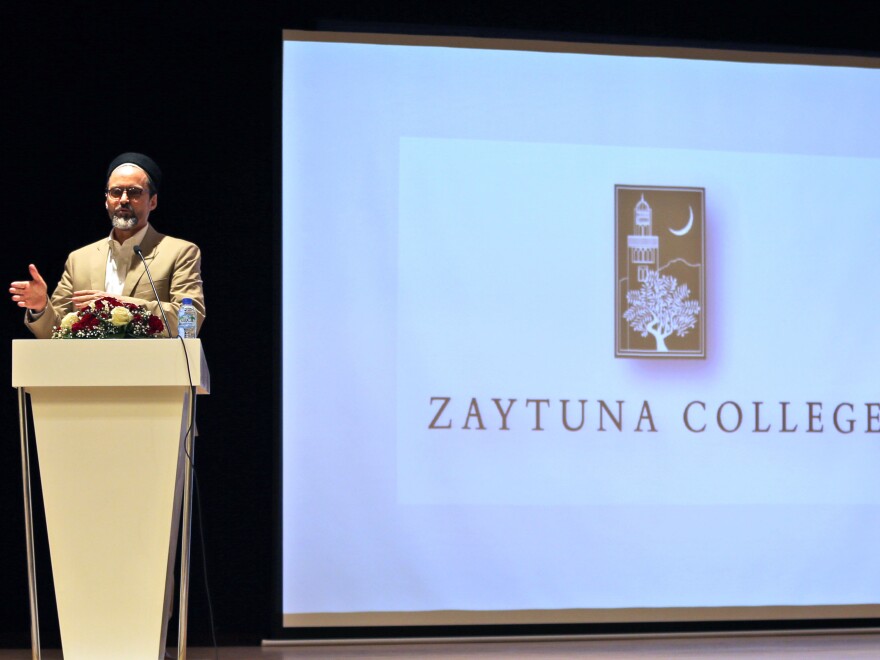The rise of ISIS and other Muslim extremist groups in the Middle East, Africa and South Asia has brought horrific persecution of non-Muslims — Christians, Jews and other religious minorities. Now, a group of Islamic scholars, Muslim leaders and government ministers from Muslim-majority countries has promised to work together to protect those minorities, saying Islam forbids religious persecution.
More than 100 countries were represented at the gathering of Muslim leaders in Marrakech this week, sponsored by the Moroccan government and the Forum for Promoting Peace in Muslim Societies, an organization led by Islamic scholar Sheikh Abdullah bin Bayyah.

One of the organizers, Sheikh Hamza Yusuf from the United States, says the meeting had one focus: the plight of religious minorities in Muslim lands.
"We have people being enslaved into sexual slavery," he told NPR from Marrakech. "We have Christian churches that have been there for long before Islam was in these lands, that are being destroyed. And we have Jews in Yemen, one of the oldest Jewish communities, now the very existence of which is threatened."
While some prominent Muslim leaders belittle the plight of non-Muslims in their countries, those who came to this meeting heard testimony from other faith leaders about the conditions in their countries.
Sheikh Sattar Jabbar Hilu, speaking on behalf of his Sabian sect in Iraq, said they and other minorities face killing and deportations, and the situation is getting worse.
The message from this meeting: Such persecution is un-Islamic. Nearly 1,400 years ago, the Prophet Muhammad directed the preparation of a governing outline for an Islamic state, the Charter of Medina. It was named for the city in Arabia where Muhammad had taken refuge.
At the time, Medina was inhabited by various tribes and religious groups, and the charter mandated peaceful coexistence and religious freedom for all.
"Today we need to re-publicize this document," says Recep Senturk, an Islamic scholar from Istanbul's Fatih University, who was among those in Morocco. "Especially when we see that the minority rights are violated. Those people who are involved in terror activities, they are misusing the name of Islam and misusing the name of the Prophet Muhammad to justify their evil actions."
A declaration coming out of this week's meeting in Morocco calls on Muslim intellectuals to develop a more inclusive concept of citizenship. Education authorities are urged to identify curricular material "that instigates aggression and extremism, leads to war and chaos, and results in the destruction of our shared societies."
Before leaving, the clergy from other faiths met with Sheikh bin Bayyah to discuss next steps. #Marrakesh2016 pic.twitter.com/soOLSPHtLC
— Susan Hayward (@SusieOHayward) January 27, 2016
Religious leaders are told to address the "amnesia" of their followers that blocks memories of the centuries of interfaith coexistence on their lands.
"It is unconscionable to employ religion for the purpose of aggressing upon the rights of religious minorities in Muslim countries," the declaration concludes.
Yusuf, who founded a Muslim liberal arts college in Berkeley, Calif., says the purpose of this week's meeting was to counter the extremist ideology that fuels groups like ISIS.
"We don't have any power other than our intellect and our hearts," he says. "And that's what we're fighting with. Ideas must counter ideas. You can drop all the bombs you want, but if you don't pull up weeds by their roots, they just grow back."
But this is not the first time mainstream Islamic scholars and Muslim government officials have tried to challenge extremism in the name of Islam. Shadi Hamid of the Brookings Institution studies extremist movements. And he worries efforts by these traditional Muslim scholars may not reach the right people.
"One of the audiences you're trying to persuade here are those who are on the fence, young, angry Arabs and Muslims who are looking for something to believe in," Hamid says. "The problem with these kinds of status quo scholars and governments is that they are seen as illegitimate and not credible.
"If you want to convince people who are predisposed to radicalism," he says, "you have to provide voices that they're going to see as legitimate. You don't come with these government-sponsored clerics, who are very much part of the ruling establishment in the Middle East, which itself has been a big part of the problem."
Copyright 2021 NPR. To see more, visit https://www.npr.org. 9(MDAxODc1ODA5MDEyMjg1MDYxNTFiZTgwZg004))


